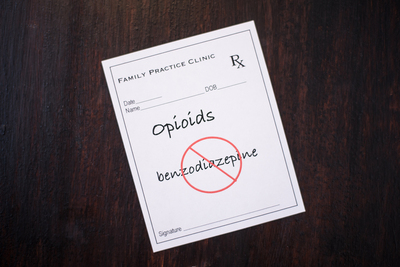Benzodiazepines, AKA “benzos,” are among the most commonly prescribed medications; however, just because they are prescribed by doctors does not mean they come without the risk of addiction. In fact, many people who legally obtain these drugs end up abusing them for their sedating effects. If you or someone you love is affected by benzo addiction, read on for a roundup of five things to know.

Opioids and benzos are a particularly deadly combination.
1. All benzos are listed as DEA schedule IV controlled substances
Benzodiazepines are a popular anti-anxiety drug used to treat a number of conditions, including panic attacks, insomnia, compulsive behavior, and generalized anxiety. They include the well-known prescription drugs Valium, Xanax, and Librium.
While television shows may joke about the liberal use of pills like Xanax and Valium, they are no laughing matter. In fact, they are categorized by the DEA as schedule IV controlled substances because their use can easily lead to physical and psychological dependence.
2 They are only recommended for short-term use
While benzos are safe and effective under the direction of a doctor for short-term use, they can lead to serious complications if used for prolonged periods of time.
Signs and symptoms of overdose may include drowsiness, confusion, dizziness, blurred vision, weakness, slurred speech, lack of coordination, difficulty breathing, and even coma. Additionally, chronic abuse symptoms may include many of the indications that led to their initial prescription, such as anxiety and insomnia.
3. They are extremely dangerous when used in combination with other drugs
When actor Heath Ledger died from an accidental overdose, he had a combination of six different drugs in his system, including Valium and Xanax. Duke University pharmacology professor Cindy Kuhn told Today: “This is not rock star wretched excess. This is a situation that could happen to plenty of people with prescriptions for these kinds of drugs.”
In fact, many people end up taking multiple drugs that add up to disaster when taken together. Added Lawrence Kobilinsky, head of forensic science at John Jay College in New York: “This was not a deliberate attempt to kill himself. This was an accident. He just took too many drugs having similar effects on the central nervous system.”
According to NPR, many drug addicts rely on a combination of opiates and benzos. Said Dr. Michael Kelley, medical director of the behavioral department at St. Mary’s Regional Medical Center in Lewiston, Maine: “It’s actually pretty rare to see somebody only using only one. Benzodiazepines and the opiates both can cause death when you take too much of them. But they potentiate each other—they make each other stronger. And so one plus one doesn’t equal two; it equals three or four.”
4. Benzos remain in the system for a long time
One of the reasons benzos are so dangerous when combined with other drugs is because they are slow to eliminate from the system.
Says Drugs.com: “Some benzodiazepines (diazepam, chlordiazepoxide) have active metabolites that remain in the system (long-acting), and this can be problematic for patients—especially older patients. Elderly patients may have liver impairment and trouble eliminating the drugs from their system. Side effects, such as dizziness, confusion, or unsteadiness may persist in the elderly who are prescribed long-acting benzodiazepines.”

Do you know someone whose benzo addiction or abuse signals the need for intervention?
5. Withdrawal can be severe…and underestimated
According to research published in the journal Addiction, benzo withdrawal can include symptoms such as:
- sleep disturbance
- irritability
- increased tension and anxiety
- panic attacks
- hand tremors
- sweating
- difficulty in concentration
- dry retching and nausea
- some weight loss
- palpitations
- headache
- muscular pain and stiffness
- seizure
- psychotic reactions
However, because the use of benzos is often perceived as casual or social, many people underestimate the effects of addiction, particularly with so much attention focused on the prescription opioid epidemic right now.
As benzo expert (and recovered addict) Dr. Jennifer Leigh told Huffington Post: “One of the largest misconceptions is that only people with ‘addictive’ personalities become addicted to benzos. That’s not true. For many people, the drug damages the GABA receptors in the brain and body. These changes are what make it so difficult to stop taking the drug. Lower the dose or stop the drug, and it’s welcome to hell. People stay on the drug to avoid the horrors of withdrawal.”
Unfortunately, the widespread availability of benzos combined with lack of awareness about their toxic effects is a recipe for addiction. It is this same lack of awareness that makes finding the right treatment center a must.
We’re Here to Help
Enter Harris House. For more than half a century, Harris House’s certified counselors have provided targeted care aimed at helping addicts overcome drug abuse and regain control of their lives. To learn more about Harris House’s St. Louis drug rehab programs, contact us today.







